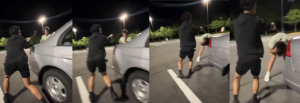Beyoncé Speaks Truth to Power with Formation
April 4, 2016
Formation is Beyoncé’s latest single which premiered shortly before her guest appearance in Coldplay’s 50th Super Bowl Halftime. This piece has been critiqued by many as they find themselves having to face the black issues the piece very blatantly discusses. This is not Beyoncé’s first time addressing black issues. She has also done so in “Superpower,” a track featuring R&B artist Frank Ocean on the self-titled album “Beyoncé.” Formation also empowers femininity and the reversal of gender norms, a characteristic that tends to get overlooked. Beyoncé uses New Orleans, where her mother is from, as the setting of the music video. Many of her visual techniques are specific to the New Orleans environment, history, and culture. Beyoncé uses visual and lyrical effect to portray her message of empowering a generation of minorities and women.
A very consistent theme in the video as well the lyrics is unity in black women. In various dancing scenes she uses black women of different shades and hair textures to show unity despite what one make think makes them different. She also shows the importance of self-love especially during your adolescent years. She displays different hairstyles and fashion styles seen in black culture. In her lyrics she says, “I like my baby hair, with baby hair and afros. I like my Negro nose with Jackson Five nostrils.” This is a direct response to the comments made about black characteristics throughout history.
Another sect of black issues Beyoncé addresses is police brutality against black males. This often is the only theme discussed about the video, which casts a shadow on Beyoncé’s stance on feminism. Although not discussed in the song itself, the video displays many forms of critique against the police force. For example, a child is seen before a group of police men, dancing as they stand armed. This scene shows irony as the police force sees this child as a threat. A shot of a wall, on which the phrase “Stop shooting us” is spray painted, highlights one of the missions of Black Live Matter. The scene of a sinking police car set during Katrina–which hit News Orleans in 2005–also makes a statement about the policing system.
Beyoncé is not a stranger to strong pieces about feminism. From “Who Run the World (Girls)” to “Grown Woman,” Beyoncé has been an advocate for women’s rights through her songs. Formation goes into depth about gender norms of society. Often, we see males of a heterosexual relationship seen as gift givers to their female counterparts (with offerings such as a new bags or a spa trip). In Formation, Beyoncé states “Drop him off at the mall, let him buy some J’s, let him shop up, ’cause I slay. I might get your song played on the radio station, ’cause I slay” to display the reversal of roles. Throughout history, women were placed in lower positions and were to satisfy their spouse with children and submissive behavior. These lines beg to differ, as she places herself in a position of power and influence.











